Audicus Hearing Aids Review 2025: Costs and Features Expert Analysis
Key Takeaways
- Hearing aids from Audicus range from $1,398-$2,998 per pair.
- The company offers two different hearing aid styles: receiver-in-canal (RIC) and completely-in-canal (CIC).
- Audicus has a free online hearing test and a mobile app.
Having rechargeable batteries, digital noise reduction, and Bluetooth were among the top choices for features in a hearing aid, according to our team’s hearing aid survey. Audicus, a 10-year-old hearing aid company, offers those features in its Spirit and Omni models—and offers a new completely-in-canal hearing aid, as well.
In this review, our team will break down the details of the four models, discuss the mobile app and customer support options, and explain ways to save money, such as using Medicare for hearing health.
Why trust our expert review?
Our team recommends products and services we believe provide value in the lives of our readers. We’ve spent more than 5,000 hours conducting in-depth research on hearing aid devices to give you the most accurate hearing aid review. To make these selections, we:
- Consulted with audiologists and geriatric care experts
- Mystery shopped 18 brands
- Surveyed hundreds of hearing aid users
- Tested various models of hearing aids
- Interviewed experts in the field
- Read thousands of verified customer reviews
Read more about our hearing aid review methodology.
Pros and cons of Audicus hearing aids
Table 1 Comparison of Audicus hearing aids models
Mini | Spirit 1 | Spirit 2 | Omni | Omni 2 | |
|---|---|---|---|---|---|
| Price per pair | $2,498 | $1,398–$1,598 | $1,798–$1,998 | $2,398–$2,598 | $2,798–$2,998 |
| Type of hearing aid | CIC | RIC | RIC | RIC | RIC |
| Type of hearing loss | Mild to moderate | Mild to moderate | Mild to moderate | Mild to moderate | Mild to moderate |
| Battery type | Disposable | Rechargeable or disposable | Rechargeable or disposable | Rechargeable or disposable | Rechargeable or disposable |
| Bluetooth capability | No | Yes | Yes | Yes | Yes |
| Customization | Yes | Yes | Yes | Yes | Yes |
| Water resistant | Yes | Yes | Yes | Yes | Yes |
| Telecoil | No | Yes | Yes, by request | Yes | Yes, by request |
| Directional microphone | Yes | Yes | Yes | Yes | Yes |
| Noise reduction | Yes | Yes | Yes | Yes | Yes |
| Processing channels | 12 | 14 | 16 | 16 | 20 |
Audicus model reviews
Mini

- Price per pair: $2,498
- Dimensions: 0.7” D x 0.3” W x 0.4” H
- Weight: 0.03 oz
- Type of hearing aid: Completely-in-canal (CIC)
- Degree of hearing loss: Mild to moderate
- Battery type: Disposable
- Bluetooth capability: No
The Mini is the newest and only completely-in-canal (CIC) model Audicus offers for those with mild to moderate hearing loss. It comes with disposable batteries (size 10) which need to be replaced every five to seven days. For those with dexterity issues, poor vision, or arthritis, frequently changing small and hard-to-handle batteries could be a significant challenge.
The Mini is the lightest of the four models and has 12 processing channels. It also only comes in one color option: red and blue hearing aids (red for the right ear and blue for the left), which can be helpful for someone with impaired eyesight. If having a discreet hearing aid is a concern for you, this device is still small enough to fit completely in your ear so the colors aren’t noticeable.
While this is the only Audicus model without Bluetooth capabilities, it does connect to the Rexton app (via Apple Store and Google Play). When our team clarified with Audicus support on how this works, they informed us that the hearing aids communicate with the app via little chirps and beeps, which can be heard when pairing the devices to the app. The hearing aids also connect to a small remote for you to change the volume and programs (auto, noise/party, music, and outdoors).
Spirit 1
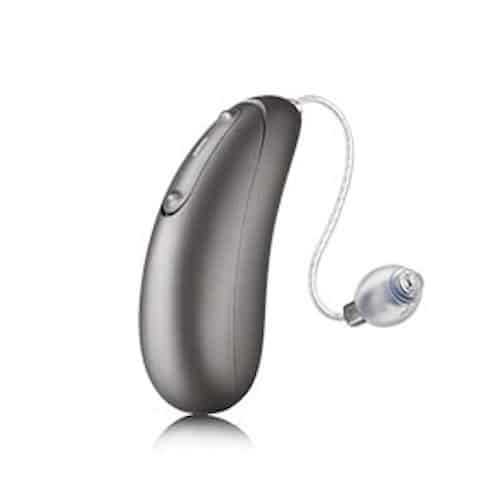
- Price per pair: $1,398–$1,598
- Dimensions: 0.48″ D x 0.34″ W x 1.2″ H
- Weight: 0.04 oz
- Type of hearing aid: Receiver-in-canal (RIC)
- Degree of hearing loss: Mild to moderate
- Battery type: Rechargeable or disposable
- Bluetooth capability: Yes
The Spirit 1 hearing aid is the entry-level receiver-in-canal (RIC) device from Audicus with 14 processing channels. It also has two directional microphones, to help amplify sounds coming from in front of you to help you hear and communicate better in conversations.
The Spirit 1 has built-in Bluetooth connectivity for streaming and connecting to the Audicus mobile app, allowing Audicus hearing aid specialists to connect and make remote adjustments to your hearing aids through the Hearing Remote app.
If you prefer to adjust them on your own, the app also allows you to take the experience into your own hands and make adjustments, such as volume control, noise reduction, or changing your hearing aid program for a specific listening environment—for example, watching television versus listening to conversations in a restaurant. You can do this via the Hearing Remote app or with a remote control device.
Spirit 2

- Price per pair: $1,798–$1,998
- Dimensions: .48″ D x .34″ W x 1.12″ H
- Weight: NA
- Type of hearing aid: Receiver-in-canal (RIC)
- Degree of hearing loss: Mild to moderate
- Battery type: Rechargeable or disposable
- Bluetooth capability: Yes
The Spirit 2 also comes with either rechargeable or disposable battery options and has many similarities to the Spirit 1—but with additional advancements.
Compared to the Spirit 1, the Spirit 2 is 10% smaller, plus there’s more memory, quicker scanning technology—thanks to the Series 2 chip—as well as further improvements in quality of sound, environmental adaptation, noise reduction, clarity, and overall performance. Additionally, you can add telecoil technology upon request, as well as two more processing channels—it has 16 compared to the 14 channels with the Spirit 1.
The Spirit 2 also has advanced remote adjustment features and is compatible with the Remote Hearing app. It offers connection to two Bluetooth devices at once, with seamless switching via a tap control feature. For example, you can easily switch between streaming a show on your TV to taking a call. The Spirit 2 Series offers a true state-of-the-art hearing aid option for under $2,000.
Omni 1
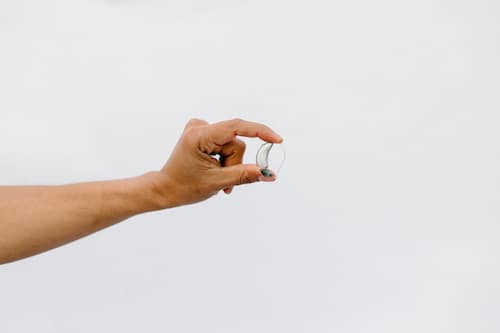
- Price per pair: $2,398–$2,598
- Dimensions: 0.48″ D x 0.34″ W x 1.2″ H
- Weight: 0.04 oz
- Type of hearing aid: Receiver-in-canal (RIC)
- Degree of hearing loss: Mild to moderate
- Battery type: Rechargeable and disposable
- Bluetooth capability: Yes
The Omni 1 is a step up from the Spirit Series but has several similarities. This model is also an RIC-style type hearing aid, treats mild moderate hearing loss, features Bluetooth streaming, and offers 16 programming channels and two directional microphones.
In comparison to the Spirit 2, the Omni 1 does not feature the Series 2 chip for increased memory and faster scanning technology, but it does offer advanced Speech Finder (enhances speech sounds from all directions) technology, which the Spirit 2 does not.
When our team tested the Omni, it took only one try and approximately two minutes to connect to Bluetooth. They noted the process for connecting was very intuitive, and hands-free calling was automatically connected. With the hands-free calling feature, you can accept calls from your smartphone directly through your hearing aids, with just a tap to the multifunction button on the hearing aid. The button is easy to locate while wearing the hearing aids.
If you want a hearing aid that has advanced features and is easy to set up, the Omni could be a good choice for you.
Omni 2
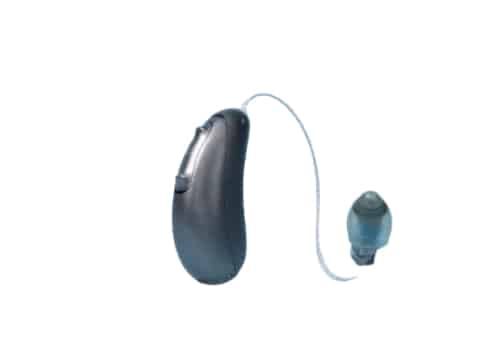
- Price per pair: $1,798–$1,998
- Dimensions: .48″ D x .34″ W x 1.12″ H Weight: NA
- Type of hearing aid: Receiver-in-canal (RIC)
- Degree of hearing loss: Mild to moderate
- Battery type: Rechargeable or disposable
- Bluetooth capability: Yes
The Omni 2 brings many of the same features from the Omni 1 hearing aid device, but with additional upgrades. This is the newest and most advanced hearing aid offered by Audicus. Like the Omni 1, the Omni 2 is an RIC style, treats mild to moderate hearing loss, offers Bluetooth streaming capabilities, and includes enhanced Speech Finder technology.
Also similar to the Omni 1, the Omni 2 has two directional microphones and offers telecoil and a tinnitus masker by request, but this model offers 20 channels with Speech Finder, which is four more processing channels than the Omni 1.
Since the Omni 2 is part of the new Series 2 rollout, it has similar features to the Spirit 2 as well. These include the ability to connect to two Bluetooth devices with seamless switching thanks to a tap control feature, a new circuit that offers larger memory and faster scanning technology for a quicker environment detection, and an overall sound experience improvement. Plus, like the Spirit 2, the Omni 2 is 10% smaller than the Omni 1.
The Omni 2 is available in four colors: beige, silver, black, and gray, and it’s also compatible with the Audicus Hearing Remote App.
How much do Audicus hearing aids cost?
Audicus hearing aids cost $1,398–$2,998 per pair. The price varies based on a few factors, such as the style: receiver-in-canal (RIC) and completely-canal (CIC); and the battery type: disposable or rechargeable. It also depends on the technology level. For example, the Spirit and Omni have more processing channels and higher prices.
How to save money on Audicus hearing aids
One way to save money on Audicus hearing aids is to opt in to the Audicus Premier monthly membership plan. With the plan, you get a new hearing aid replacement every 18 months, an unlimited warranty and unlimited cleaning supplies, and loss and damage insurance are included.
But the Audicus Premier membership is only available when you purchase the brand’s Series 2 rechargeable hearing aid models, the Spirit 2 and Omni 2. The plan comes with a one-time signup fee of $249 and costs $99 per month for the Spirit 2 and $149 per month for the Omni 2. If you opt into Audicus Premier, you can cancel your monthly subscription at any time.
You can also check with your local Lions Clubs1, area agency on aging2, or other charitable foundations, like the Hearing Aid Project.3 If you have Medicare Advantage, your plan might offer hearing aid coverage through select providers.4 Check with your insurance provider for more information.
And according to the Internal Revenue Service (IRS), hearing aids and batteries are considered medical expenses, so you can use your flexible spending account (FSA) or health savings account (HSA) to cover those costs.5
For veterans or active duty military personnel, the U.S. Department of Veterans Affairs covers medical services, such as audiology.6 Finally, review NCOA’s Benefits CheckUp for more benefits in your area.
Customer service and payment options
You can reach Audicus customer support by email, phone, or chat.
- Phone: 855-971-0451, 9 a.m. to 7 p.m. ET, Monday through Sunday
- Email: help@audicus.com
- Chat: On the lower-right hand corner of the website, available 24/7
When our team used the chat feature, Isabel was supportive and answered all our questions within five minutes (see Figure 1).
Figure 1 Audicus online support chat
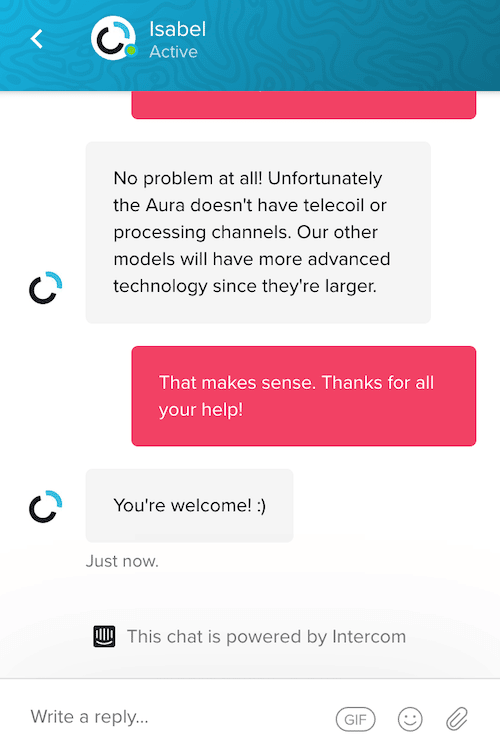
Audicus has a customer support center on its website, where you can access frequently asked questions (FAQ), video tutorials, product manuals, supplies and services, and returns and reprogrammings. The FAQ is easy to read and broken down by hearing aid model and other common hearing aid questions.
When purchasing Audicus hearing aids, you can select overnight delivery ($60), standard shipping ($4), or free shipping. You can pay with all major credit cards or PayPal.
Audicus hearing aids online hearing test
To help you determine your level of hearing loss, Audicus offers a free online hearing test. To take the test, you’ll be required to submit your gender, age, email, and phone number. The fields for name and ZIP code are optional.
The first part of the test prompts you to make sure you’re in a quiet environment, your headphones are plugged into your computer, and your computer volume is set to 50% (see Figure 2). Then, the test program will play a tone to test the earbuds and ensure they’re working properly.
Figure 2 Member of our team testing Audicus online hearing test

Next, different sound volumes will be played into each ear, with instructions to tap the spacebar when you hear the tone, and the “Not Heard” button when you cannot hear the tone (see Figure 3).
Figure 3 Audicus online hearing test
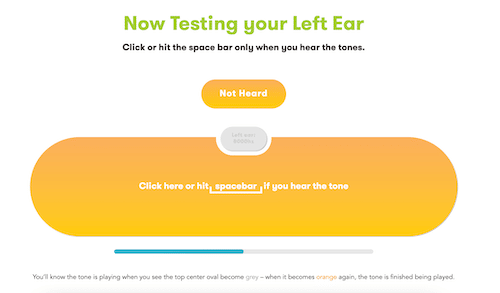
The test takes about five minutes to complete. After taking the test, you’ll receive a series of questions, such as the following:
- Have you worn hearing aids?
- How likely are you to buy hearing aids in the next few months?
- What kind of health insurance do you have?
Once you finish answering the questions, a link to your results will be emailed to you (see Figure 4).
Figure 4 Audicus hearing test results
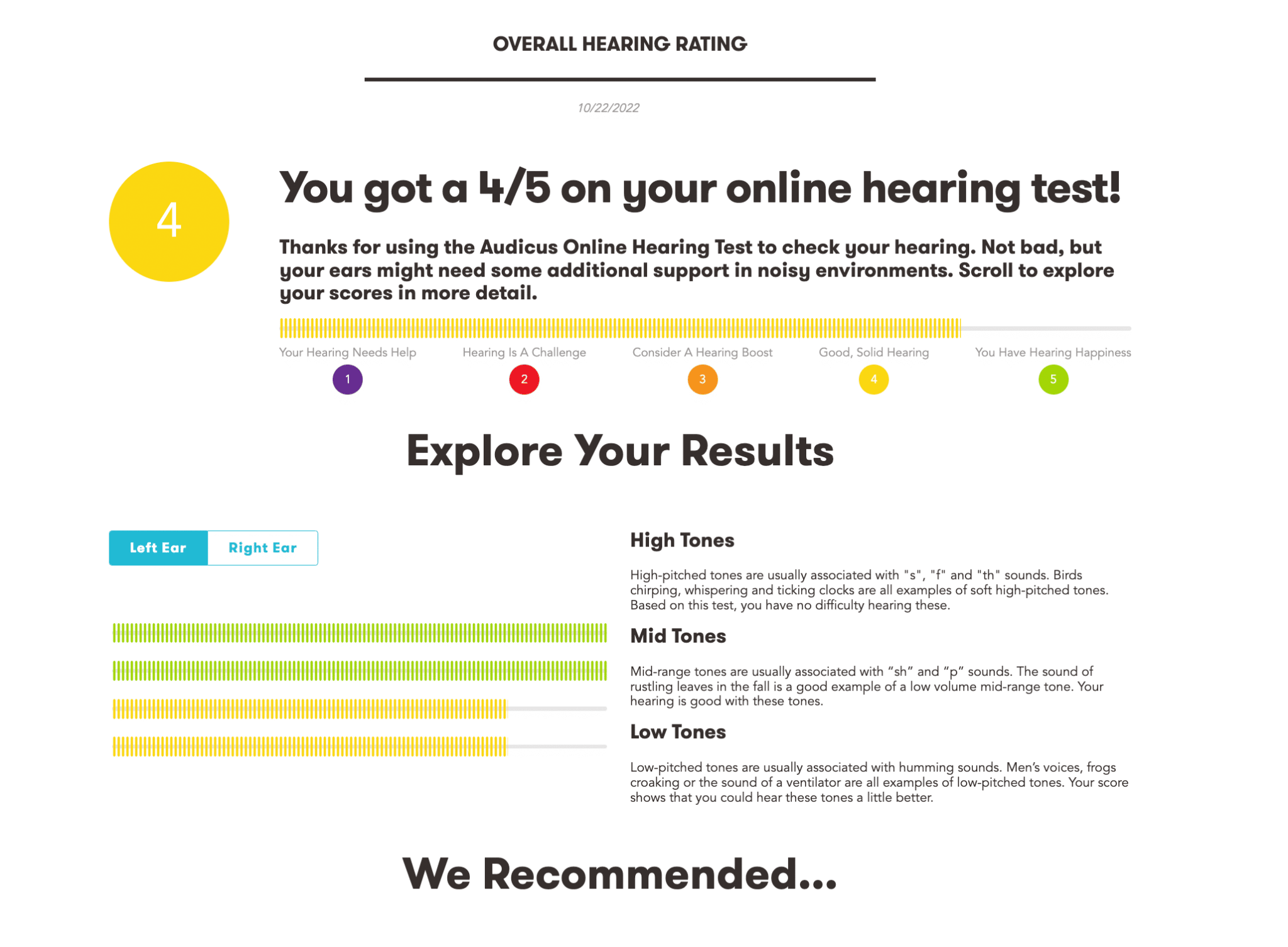
Convenience is a big benefit of an online hearing test, and online hearing tests “may help to identify the presence and degree of hearing loss,” according to a study published in the Journal of the American Academy of Audiology.7
A drawback of online hearing tests is that they don’t diagnose the cause of your hearing loss, which may be easily treatable, like earwax blockage, or a sign of something more serious. Hearing professionals recommend you see a specialist for an in-person hearing test to determine the cause.
To learn more, check out our review of the best online hearing tests.
Audicus hearing aids mobile app
Audicus offers a mobile app that connects with the Spirit and Omni models. The app (Hearing Remote) is on the Apple Store and Google Play, and it allows you to make several adjustments to your hearing aids.
Here are a handful of ways to adjust your Audicus hearing aids using the app:
- Control volume, reduce noise, and enhance speech
- Change programs according your activity, such as watching television or listening to conversations in a restaurant
- Receive remote adjustments from your hearing aid professional
- Adjust the tinnitus masker (if applicable)
- Check battery charge status
The Mini doesn’t connect with the Hearing Remote app, but it does connect to the Rexton app (Apple Store and Google Play) via little chirps and beeps, which can be heard when pairing the hearing aids.
What to look for in the best hearing aids
“Hearing aids come in different styles and technology levels,” said Sarah Lundstrom, AuD, an ABA Certified fellow of the American Academy of Audiology, and a member of the Florida Academy of Audiology. Determining which hearing aid is best for you, she said, will “depend on your personal preferences, your lifestyle, hearing needs, and the features you want or need.”
You should also consider your budget, type of hearing loss, and the style you prefer.
Budget
If you’re on a budget and looking for inexpensive hearing aids, check out our selections of the most affordable hearing aids. Audicus won “Best Budget-Friendly Bluetooth” for offering Bluetooth hearing aids at a fraction of the price that other advanced hearing aids sell for in our team’s best hearing aids review.
Type of hearing loss
For adults 18 and older, if you have mild to moderate hearing loss, you might be a good candidate for purchasing over-the-counter (OTC) hearing aids such as Audicus hearing aids. If you have severe to profound hearing loss, a Phonak hearing aid might be a better option for you. And for those with tinnitus, our team named the Widex Moment “Best for Tinnitus” in the best hearing aids review.
Style
If you prefer a discreet hearing aid and have mild to moderate hearing loss, you might want to consider a completely-in-canal (CIC) hearing aid style, such as Audicus Mini or a model from Eargo. If you have more than moderate hearing loss, want a few more features, and don’t mind a bigger, more visible hearing aid, Jabra Enhance hearing aids could be the option for you.
Table 2 Comparison of Audicus vs. other brands
Audicus | Jabra Enhance | Eargo | MDHearing | ||
|---|---|---|---|---|---|
| Price per pair | $1,398–$2,998 | $1,195–$1,995 | $99–$249 | $1,650–$2,950 | $299–$699 |
| Type of hearing aids | CIC, RIC | RIC | ITC | CIC | BTE |
| Types of hearing loss | Mild to moderate | Mild to moderate | Mild to moderate | Mild to moderate | Mild to moderate |
Audicus hearing aid customer reviews
On the Better Business Bureau (BBB), Audicus has an A+ rating and a customer review rating of 3.09 out of 5, based on 11 customer reviews.8
In our team’s hearing aids survey, the biggest challenge of Audicus hearing aids was that they were uncomfortable to wear, which is not an uncommon struggle of hearing aid users in general.
This can be more of an issue with over-the-counter (OTC) hearing aids, since they don’t come with an in-person fitting. However, some hearing care clinics that sell prescription hearing aids are now offering fittings and adjustments for customers who need help with their OTC hearing aids. You can use the online locator from the American Academy of Audiology to find a hearing care clinic in your area.
“I’ve struggled with my hearing loss for years and finally decided to address it. [I] went locally initially and they were trying to charge me 8k for a pair of hearing aids! My brother recommended Audicus and they were offering the same pair for just over 3k. I purchased [them] and the entire process was great. Everyone was super helpful and the hearing aids work great. I’d say if support is something that is important to you, Audicus is the way to go.”
GERTRUDE, VERIFIED CUSTOMER REVIEW (BBB.ORG)
“Having done thorough research, I find Audicus is still the low-cost, high-quality leader in digitally adjustable hearing aids. They’ve always been quickly responsive when I’ve emailed or called. I’m about to order a new aid from Audicus right now!”
BARBARA, VERIFIED CUSTOMER (BBB.ORG)
“While I have no complaints about the hearing aid itself, I am frustrated with the support. There is a very high pressure sales team, but it is almost impossible to get in touch with anyone that actually is in CUSTOMER SUPPORT, not sales.”
ANOUCK, VERIFIED CUSTOMER REVIEW (BBB.ORG)
Bottom line
Audicus offers five different types of hearing aids that support people with mild to moderate hearing loss. (Note that while Audicus advertises its products treat mild to severe hearing loss, the FDA states OTC hearing aids can only be used to treat mild to moderate hearing cases at this time.) Prices range from $1,398–$2,998 per pair, and some have advanced technology, including Bluetooth and rechargeable batteries.
Audicus could be a good choice if you’re looking for a budget hearing aid with advanced technology, and you prefer the convenience of buying a hearing aid online. If you’d prefer a less advanced, basic hearing aid, another option might be better for you, such as Eargo.
Frequently asked questions
Yes. Audicus is accredited on the BBB with an A+ rating and offers affordable prices for advanced hearing aids, such as those with rechargeable batteries, noise reduction, and Bluetooth technology.
Audicus hearing aids are FDA-registered and have to be registered annually.9 FDA-approval means the medical device is safe and effective for customers.10 With the new OTC hearing aids ruling by the FDA in August 2022, several companies are opting into more affordable and accessible hearing aid options.
Audicus was founded in 2012 by Patrick Freuler when he noticed a gap in the hearing aid market. With the high costs of hearing aids, he wanted to establish a company that had high-quality hearing aids for a fraction of the price.
Audicus hearing aids range from $1,398–$2,998 per pair. The company offers two hearing aid styles: receiver-in-canal (RIC) and completely-in-canal (CIC). Prices vary on style and the advanced technology included, such as Bluetooth connectivity and processing channels.
Hearing aids last from three to seven years. This is dependent on how the hearing aid user cares for it, since things like heat exposure and how often the devices are cleaned can impact the life of the hearing devices. Audicus has one disposable battery option, which lasts five to seven days, and rechargeable battery options, which last 16 hours and take three to five hours to charge.
Audicus hearing aids are made by Unitron, which is owned by Sonova, a well-known manufacturer of hearing aids. Sonova, based in Switzerland, also owns Phonak, which makes advanced hearing aids for a higher price than Audicus.
Have questions about this review? Email us at reviewsteam@ncoa.org.
Sources
- Lionsclubs.org. Lions Clubs. Found on the internet at https://www.lionsclubs.org/en/explore-our-clubs/eyeglasses-and-hearing-aids-recycling
- Eldercare.acl.gov. Area agencies on aging. Found on the internet at https://eldercare.acl.gov/Public/About/Aging_Network/AAA.aspx
- Hearing Aid Donations. Hearing Aid Project. Found on the internet at https://hearingaiddonations.org/
- Medicare.gov. Medicare Advantage. Found on the internet at https://www.medicare.gov/Pubs/pdf/12026-Understanding-Medicare-Advantage-Plans.pdf
- IRS. Publication 502. Found on the internet at https://www.irs.gov/pub/irs-pdf/p502.pdf
- VA.gov. Veteran Health Benefits. Found on the internet at https://www.va.gov/health-care/about-va-health-benefits/
- Mosley C, et al. Journal of the American Academy of Audiology. Reliability of the Home Hearing Test. Found on the internet at https://www.ncbi.nlm.nih.gov/pmc/articles/PMC6710072/
- Better Business Bureau. Audicus. Found on the internet at https://www.bbb.org/us/ny/new-york/profile/hearing-assistive-devices/audicus-inc-0121-148665/customer-reviews
- FDA.gov. FDA-Registered Medical Devices. Found on the internet at https://www.fda.gov/medical-devices/consumers-medical-devices/are-there-fda-registered-or-fda-certified-medical-devices-how-do-i-know-what-fda-approved
- FDA.gov. FDA Approval. Found on the internet at https://www.fda.gov/news-events/approvals-fda-regulated-products/about-fda-product-approval

